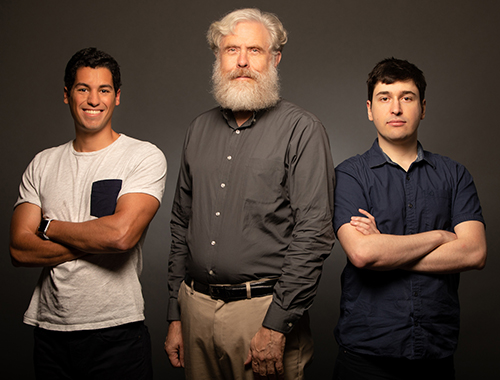Different model for medical laboratory testing has customers receiving compensation for the use of their genetic data while maintaining control over who receives it and how it is used
Clinical laboratory leaders and anatomic pathologists will agree that offering whole genome sequencing to customers for FREE is unique in the direct-to-consumer (DTC) genetics market. Nevertheless, Nebula Genomics (Nebula), a start-up genetics company in Massachusetts, has announced exactly that.
Founded by George Church, PhD, Harvard Medical School/MIT professor of genetics, health sciences and technology, and Harvard graduates Dennis Grishin, PhD, and Kamal Obbad, Nebula aims to connect customers with scientists to advance biomedical research, according to a news release.
Interested customers answer questions about their health history, physical activities, medications, and more. The information helps them earn Nebula credits toward free genetic information. Researchers then can review this biographic information and elect to subsidize the cost of sequencing specific customers in exchange for access to the resulting genomic data, which they use to develop pharmaceutical drugs and treatments.
Customers wishing to avoid answering questions can pay Nebula $99 for a personal genome sequencing, which delivers a basic analysis of their ancestry and inherited traits.
“Ninety-nine bucks will get you a little bit of genetic information. But to get the full thing, companies or researchers will have to be interested in either your traits or your genome or both,” Church told National Public Radio (NPR).
The “full thing,” as Church put it, is a full genome sequence using next-generation sequencing technology, which costs about $1,000. Nebula uses 30-times genetic coverage during the sequencing, BioSpace explained.
“We are using next-generation sequencing technology. This enables us to generate thousands of times more data from a genome than most of our competitors,” Dennis Grishin, PhD, Nebula’s co-founder and Chief Scientific Officer told Digital Trends.

Kamal Obbad (left), George Church, PhD (center), and Dennis Grishin, PhD (right) created Nebula Genomics “to bring the costs of personal genome sequencing down to zero and to address the issues of genomic data ownership and privacy,” Grishin told Digital Trends. “Our mission is to achieve mass adoption of personal genome sequencing, which would lead to a genomic revolution that would transform biomedical research and healthcare.” (Photo copyright: Nebula Genomics.)
Transparency, Blockchain, and Consumer Control of Data
Nebula says its process enables participants to control what genetic data researchers can access and how it is used. According to NPR, the process may begin with a researcher or pharmaceutical firm contacting Nebula expressing interest in studying a group of patients with a specific disease—such as diabetes—adding that Nebula follows up the request with an encrypted search of participants.
“Nebula will enable individuals to get sequenced at much lower cost through sequencing subsidies paid by the biopharma industry,” Church told BioSpace. “We need to bring the costs of personal genome sequencing close to zero to achieve mass adoption.”
According to a Ledger Insights (Enterprise Blockchain News) report, a blockchain platform enables customers to choose how they want their data used and by whom and be compensated for it. But the customers’ actual genomic data is stored on an Arvados storage platform at Veritas Genetics, a genome sequencing company Church also co-founded.
“I’m hopeful that this model (financial reward and control over data) will actually attract people where historically people have been very disinterested in participation in research,” Church told NPR.
Putting DNA Sequences Up for Sale
Nebula Genomics is not the only start-up attempting to match customers with DNA buyers. EncrypGen, a peer-to-peer genomic data marketplace founded in 2016, says that it enables DNA data to be bought and sold with DNA tokens.
EncrypGen’s Chief Executive Officer and co-founder David Koepsell, PhD, told The Scientist that the company has plans to soon offer whole genomic testing through a partner and users may be able to subsidize the $1,500 cost with tokens earned through the platform.
“We are the world’s first blockchain genomic marketplace serving as a benefit to science and the public,” EncrypGen claims on its Website.
Medical laboratory leaders may wonder what impact Nebula’s offer for free whole genome sequencing will have. It may result in many more people participating in whole genome sequencing and having a master blueprint for managing their health, which is a good thing. It’s also possible more studies about drugs to precisely prevent and treat disease will go forward as researchers and customers connect and act.
—Donna Marie Pocius
Related Information:
Start-up Offers to Sequence Your Genome Free of Charge, Then Lets You Profit from It
Nebula Genomics Offers Free Whole Genome Sequencing
This Start-up Will Sequence Your Entire Genome for Free—But There’s a Catch
Nebula Launches DNA Blockchain Platform
Nebula Genomics Wants to Sequence Your Entire Genome for Free … With One Little Catch



How can I Participate in this program?
I’m in need of whole Genome testing / DNA testing and Would love to contribute to medical breakthroughs and genome data. I have ‘elders-danlo’ & Knowing which type